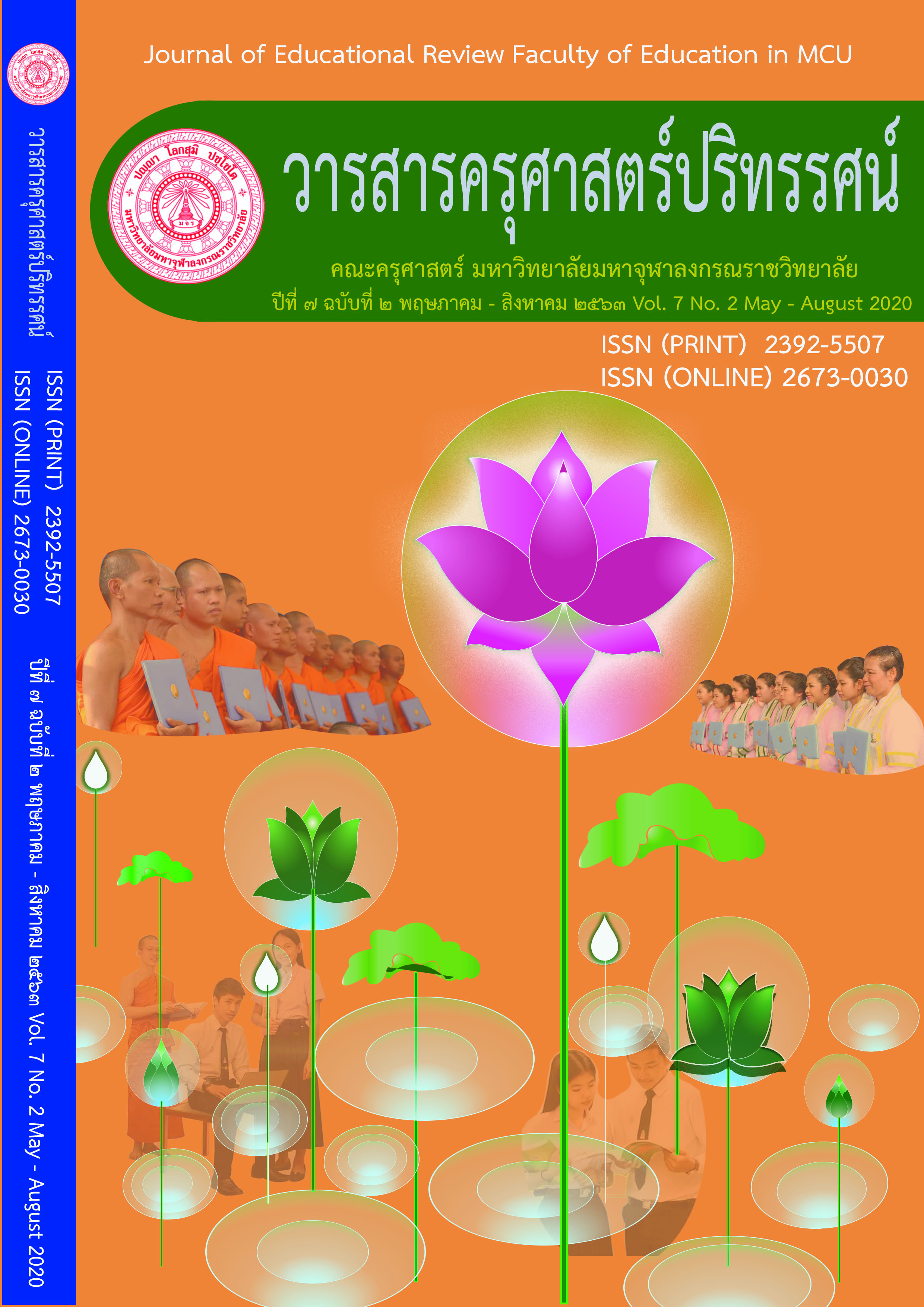DEVELOPMENT OF SCHOOL ADMINISTRATORS ACCORDING TO SANGAHAVATTHU PRINCIPLES IN PRIMARY SCHOOLS UNDER BANGKOK METROPOLITAN ADMINISTRATION
Main Article Content
Abstract
The purposes of this research article were 1) to study the characteristics of school administrators in primary schools under Bangkok Metropolitan Administration, 2) to develop primary school administrators according to Sangahavatthu IV principle, and 3) to propose the development process for school administrators according to Sangahavatthu IV principle. Mixed methods research was designed and there were 3 research steps, which consisted of step 1 studying the characteristics of school administrators in elementary schools. Questionnaires were used by 390 school administrators in primary school. Data were analyzed using descriptive statistics such as frequency, percentage, mean and standard deviation. Step 2 was to develop the school administrators according to Sangahavatthu 4principle using interview with 24 key informants. Data was analyzed by content analysis. Step 3 was to propose the development process of the school administrators according to Sangahavatthu 4 principle by having a focus group discussion of 9 experts, and data was analyzed using content analysis. The findings of this study were 1) the characteristics of administrators in primary schools under Bangkok Metropolitan Administration were shown overall at high level in 3 aspects consisted of leadership, morality and ethics, knowledge and ability. 2) The development of the characteristics of school administrators according to physical and performance aspects in 3 characteristics consisted of leadership, morality and ethics, and knowledge and ability integrating with Sangahavatthu IV principles that bases and acts of solidarity, sympathy, and doing favours, giving kindly speech, useful conduct, and even and equal treatment. 3) School administrators' development process according to Sangahavatthaya 4 principle for the primary school under Bangkok (SAS) consisting of (1) principles, (2) objectives, (3) operating systems, and (4) operational processes which is the development of school administrators according to Sangahavatthu IV principle for the primary school under Bangkok by integrating Sangahavatthu IV principle with the characteristics of the school administrators in all 3 aspects.
Article Details
ทัศนะและความคิดเห็นที่ปรากฏในบทความในวารสารฉบับนี้ถือเป็นความรับผิดชอบของผู้เขียนบทความนั้นเพียงผู้เดียว และไม่ถือเป็นทัศนะและความรับผิดชอบของกองบรรณาธิการ
กองบรรณาธิการขอสงวนสิทธิ์ในการคัดเลือกบทความลงตีพิมพ์และจะแจ้งให้เจ้าของบทความทราบหลังจากผู้ประเมินบทความตรวจอ่านบทความแล้ว
ต้นฉบับที่ได้รับการตีพิมพ์ในวารสารครุศาสตร์ปริทรรศน์ คณะครุศาสตร์ มหาวิทยาลัยมหาจุฬาลงกรณราชวิทยาลัย ถือเป็นกรรมสิทธิ์ของคณะครุศาสตร์ มหาวิทยาลัยมหาจุฬาลงกรณราชวิทยาลัย ห้ามนำข้อความทั้งหมดหรือบางส่วนไปพิมพ์ซ้ำ เว้นเสียแต่ว่าจะได้รับอนุญาตจากมหาวิทยาลัยฯ เป็นลายลักษณ์อักษร
References
กระทรวงศึกษาธิการ. (2562). พระราชบัญญัติการศึกษาแห่งชาติ พ.ศ. 2562. กรุงเทพมหานคร: โรงพิมพ์คุรุสภา.
กองนโยบายและแผนงาน สำนักผังเมือง กรุงเทพมหานคร. (2550). สถานศึกษาทุกสังกัด เขตกรุงเทพมหานคร. แหล่งที่มา http://cpd.bangkok.go.th:90/web2/strategy/reportstudy50/socialwell/50-1%20schoolinbma.pdf สืบค้นเมื่อ 10 ธ.ค. 2562.
ธานินทร์ ศิลป์จารุ. (2552). การวิจัยและวิเคราะห์ข้อมูลทางสถิติด้วย SPSS. พิมพ์ครั้งที่ 10. กรุงเทพมหานคร: บิสซิเนสอาร์แอนด์ดี.
บุญชม ศรีสะอาด. (2558). วิจัยเบื้องต้น. กรุงเทพมหานคร: สุวีริยาสาส์นการพิมพ์.
ประคอง รัศมีแก้ว. (2551). คุณลักษณะผู้นำของผู้บริหารในสถานศึกษาที่มีคุณภาพ. ดุษฎีนิพนธ์ปรัชญาดุษฎีบัณฑิต. มหาวิทยาลัยศิลปากร.
ไพโรจน์ พรหมมีเนตร. (2552). รูปแบบการพัฒนาภาวะผู้นำทางการศึกษาตามหลักพุทธธรรม. ดุษฎีนิพนธ์การศึกษาดุษฎีบัณฑิต. มหาวิทยาลัยนเรศวร.
มหาวิทยาลัยจุฬาลงกรณราชวิทยาลัย. (2539). พระไตรปิฎกฉบับภาษาไทย ฉบับจุฬาลงกรณราชวิทยาลัย. กรุงเทพมหานคร: โรงพิมพ์มหาจุฬาลกรณราชวิทยาลัย.
มหาวิทยาลัยสุโขทัยธรรมาธิราช. (2555). การบริหารงานบุคคลในโรงเรียน. นนทบุรี: โรงพิมพ์มหาวิทยาลัยสุโขทัยธรรมาธิราช.
รุ่ง แก้วแดง. (2553). ปฏิวัติการศึกษาไทย. พิมพ์ครั้งที่ 5. กรุงเทพมหานคร: พิมพ์ดี.
สมชาย รัตนทองคำ. (2556). ปรัชญาการศึกษา. ขอนแก่น: คณะเทคนิคการแพทย์ มหาวิทยาลัยขอนแก่น.
สุภาวดี วงษ์สกุล. (2555). รูปแบบการพัฒนาผู้นำการเปลี่ยนแปลง ที่มีประสิทธิผลในการบริหารสถานศึกษาขั้นพื้นฐาน. ดุษฎีนิพนธ์ศึกษาศาสตรดุษฎีบัณฑิต. มหาวิทยาลัยอีสเทิร์นเอเชีย.
สุภาวดี วงษ์สกุล. (2555). รูปแบบการพัฒนาผู้นำการเปลี่ยนแปลง ที่มีประสิทธิผลในการบริหารสถานศึกษาขั้นพื้นฐาน. ดุษฎีนิพนธ์ศึกษาศาสตรดุษฎีบัณฑิต. มหาวิทยาลัยอีสเทิร์นเอเชีย.
แสง จันทร์งาม. (2550). คู่มือพัฒนาคุณธรรมจริยธรรมสำหรับผู้บริหาร. พิมพ์ครั้งที่ 2. กรุงเทพมหานคร: กรมการศาสนา.
หัชพันธ์ เอื้อโชติคุณ. (2557). คุณลักษณะผู้นำที่ไม่ดีที่มีผลในเชิงลบต่อขวัญกำลังใจในการทำงานของผู้ตาม. ดุษฎีนิพนธ์ปรัชญาดุษฎีบัณฑิต. สถาบันบัณฑิตพัฒนบริหารศาสตร์.
อุทัย โล้วมั่นคง. (2553). การนำเสนอแนวทางการพัฒนาคุณลักษณะภาวะผู้นำทางจริยธรรมตามแนว
พุทธศาสนาของผู้บริหารสถานศึกษา สังกัดสำนักงานคณะกรรมการการศึกษาขั้นพื้นฐาน. ดุษฎีนิพนธ์ครุศาสตรดุษฎีบัณฑิต. จุฬาลงกรณ์มหาวิทยาลัย.
Magnuson. W. O. (1991). Characteristic of successful school business managers. Dissertation Abstracts International. 35(42).
Petros Pashiardis. (2004). Democracy and leadership in the educational system of Cyprus. Journal of Educational Administration. 42(6).
Smith. H. B. (2004). Description of effective and ineffective behavior of school principals. Dissertation Abstract International. 35.
Stogdill. R. M. (2004). Handbook of leadership: A survey of theory and research. New York: The Free.

